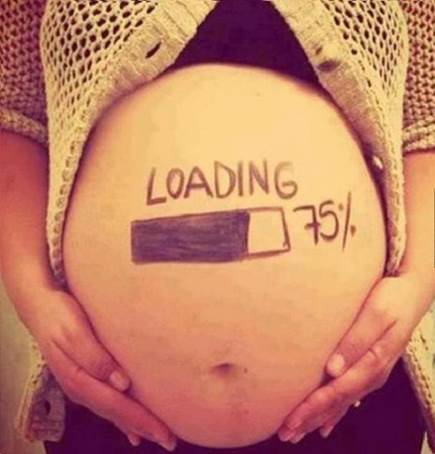The following is the top to-do list that can
provide the safest pregnancy.
Week 1
If you haven’t taken vitamin in addition,
it’s time you did so. Provide yourself with 400mg folic acid a day (600mg to
pregnant women).

In
the first week of pregnancy, you should provide yourself with acid folic.
Week 2
Make plans about the most sensible and
healthiest diet.
Week 3
If there’s any of your family members
having history of bad pregnancy (genetic disorder), you should have a
conversation with your doctor.
Week 4
You should know that you’re pregnant for
real. It’s high time you had bras that are dedicated to pregnant women. The
breast will get considerably bigger in the first month of pregnancy.
Week 5
Have tests to specify the pregnancy. In
many cases, you have to wait till the 8th week of pregnancy to
define fetal heartbeat.
Week 6
Some women might tell their family members
about the news from this week. However, it’s possible that women can still have
miscarriage in the 14th week of pregnancy. To make sure about the
news, you should hold it longer.
Week 7
Study about maternity, consider about the
insurance to have gestational and postnatal priority.
Week 8
Take ultrasound test to define fetal
heartbeat and know whether the gestation is entopic or ectopic.
Week 9
Join in antenatal class to know ways to
take care of the pregnancy and prevent miscarriage.
Week 10
Take part in classes that help you to know
how to breastfeed and look after newborns if necessary.

Pregnant
women should take pregnancy test after knowing that they’re pregnant.
Week 11
Take Chorionic Villus Sampling (CVS) to
have information about genes and chromosomes before having amniocentesis. That
test can be done around the 10th- 12th week of pregnancy.
Week 12
You can take nuchal translucency tests to
specify the risk of Down syndrome and other chromosome abnormalities.
Week 13
At that time, you are at the second
trimester of pregnancy. The risk of miscarriage is very low. So, you can
prepare to welcome the baby from now on.
Week 14
Take part in yoga classes dedicated for
pregnant women. Yoga is very good for pregnant women as it helps them reduce
muscle pain and is the best support of the labor. You can buy maternity clothes
because the bump has been getting bigger already.
Week 15
Ask doctors about tests that are necessary
to pregnancy, such as: abnormal chromosome and neural tube defect screening
tests (the triple tests) if possible. Those tests can be done around the 15th-
20th week.
Week 16
Make plans about the labor (choose a
hospital, a birth method, find an obstetrician…).

You
should be well-prepared for the birth of your child.
Week 17
Prepare financial condition for the labor.
Week 18
The week between the 14th - 20th
week is the time doctors ask you to take amniocentesis if you’re over 35
years old in order to do chromosome disorder screening (Down syndrome and
spinal bifida).
Week 19
This is the most time to define fetal sex
which can be done by ultrasound tests. Many people are able to know the sex of
their fetuses in the 13th week of pregnancy.
Week 20
This is the most relaxing time of
pregnancy, so you can have a short trip with your husband.
Week 21
Though the birth date is still pretty far
at the moment, you should ask experienced people for advice.
Week 22
Think about the one you would like to spend
with during the labor and have a talk with your husband about it.
Week 23
Attend antenatal course to learn how to
breath and labor (those thing should be done before the 36th or 37th
week of pregnancy).
Week 24
Start buying necessary things for newborns
from now on; you should buy the expensive ones first, such as the crib, the
cradle…. You also need to prepare a room for the children and have plans about
the preparation.
Week 25
Buy more maternal clothes as your dump get
very big at the moment.

Buy more maternal clothes since your
bump is getting bigger.
Week 26
From the 26th – 28th
weeks, pregnant women should have blood sugar tests to specify the risk of
gestational diabetes.
Week 27
Find someone to help you out during and
after the labor.
Week 28
From This week goes, Obstetricians will ask
you to take regular pregnancy tests, 1 each 2-3 week. And, your job is to
follow their instructions to keep you fetus safe.
Week 29
Buy necessary things for the future baby
and labor stuffs (newborn clothes, diapers, towel, clothes to wear during the
laboring…).
Week 30
Attend prenatal classes. You shouldn’t
delay doing that.
Week 31
Ask your obstetricians for labor methods.
Week 32
Learn how to bath newborns. This work is
not simple at all.
Week 33
Consider about the maternity leave.
Week 34
Wash and classify baby clothes to prepare
for the future baby.
Week 35
Make plans about cooking during and after
labor (at that time, you’re not strong enough for the cooking and you need
help).
Week 36
See your obstetrician weekly for pregnancy
test.

Pack
the clothes when seeing any of labor sign.
Week 37
Pack the clothes for the preparation of
labor when you see the signs of it.
Week 38
If you want to breastfeed your child, read
more to find the way to take care of the breast after labor so that you can
have milk as fast as possible.
Week 39
If you haven’t had the maternal leave, you
should get it now because it’s very possible that you’ll have a labor the next
day.
Week 40
Check everything and look for the sign of
labor.